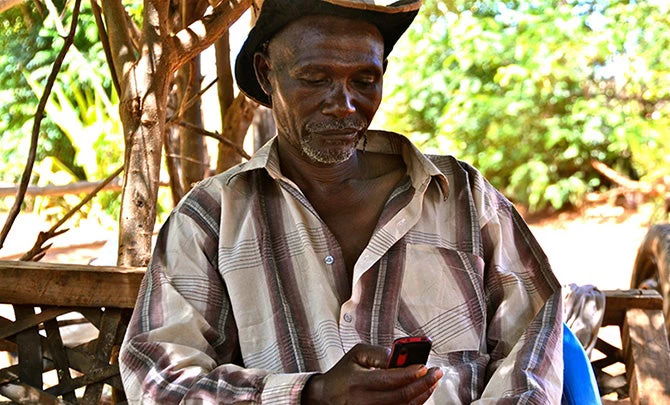It was such a pleasant sun filled morning when we descended upon Iganga town in Uganda in December. The farmers began trickling in one by one after 9 am, once they had tended to their crops and animals.
This was our first farmer field visit to Iganga, one of the districts under the World Bank-funded Agriculture Cluster Development Project, a new program from the Ugandan Ministry of Agriculture, Animal Industries, and Fisheries, which aims to assist farmers in intensifying production of key farm commodities such as rice, maize, cassava, beans, and coffee.
With our district focal point officials in tow under the guidance of Mr. Dhikusoka Joseph, the district production officer, all was set for the day to interact with this selected group of 30 farmers (15 women and 15 men). By emphasizing the purpose of the engagement from the word go, the participants were able to embrace the program activities. The event was the first of a series in preparation for the upcoming Hack4Ag Hackathon in Uganda. Its primary aim was to establish challenge areas from a grassroots perspective that will then guide the Hackathon participants in coming up with appropriate solutions.
In a bid to ensure maximum participation by all farmers, they were randomly placed in smaller working groups to give them an opportunity to deliberate on the issues to be discussed. Having understood that the usual delivery of questionnaires wouldn't work well with our audience, we opted for a discussion approach.
The farmers freely shared how they use technology, highlighting how phones and radios have had the greatest impact. While the same technologies are largely used for entertainment in urban areas, these farmers cited the search for knowledge as the greatest need they have for them.
“What I have discovered is that, if you don't have a phone as a farmer, go sell a goat and buy yourself one,” said one of the farmers. “The most important thing in farming is that if you don't have a phone, all your efforts are fruitless. Even Government workers operate using phones, they teach us on phone and when you go to their offices, chances are high that you won't find them there but through a phone call, you could redeem your crops and animals by getting guidance otherwise you end up losing your crops or animals due to government workers that are never there.”
The zeal and thirst for technology, as well as knowledge about it, was very evident. The challenges and opportunities that these farmers have identified in their trade are numerous and should be considered in any solutions development.
The eloquence with which challenges were brought out was so revealing and showed the difference in mindsets when it comes to technology use between different societal segments. For instance, while urban technology users may find interest in using phones largely for internet access, their rural farmer counterparts are keen on using them to seek farming information. Hardships ranged from lack of skills to fully exploit the phones, lack of electricity to charge phones and power radios, paying for satellite TV to technical support services for their phones.
The most interesting part of the engagement was when the farmers proposed potential solutions to their challenges. They suggested that localization of phones to suit the local communities could improve on the user experience. Use of local language interfaces, combining audio with text typing as well as translating manuals, would be very much appreciated by the largely literate, but non-English-speaking, population.
Home grown solutions are usually the most versatile when dealing with communities since they fully understand the ecosystem under which they operate. While the scope of potential solutions exceeded the likely mandate of the World Bank in the upcoming initiatives, they are worth noting considering that other partners could in future pick up on some of those identified areas.
All in all, the chances of success and sustainability of rural agricultural services that are based on mobile telephony are greater when they do not duplicate services provided by existing information sources such as the kiosks, telecentres, digital doorways and information centers. However, mobile is just one key technology component for rural farmers in Iganga, which has to be complimented with other ICTs to create greater impact.
The upcoming Hack4Ag Hackathon is expected to address the concerns that many of these rural farmers have regarding ICT integration into their activities and livelihoods.




Join the Conversation